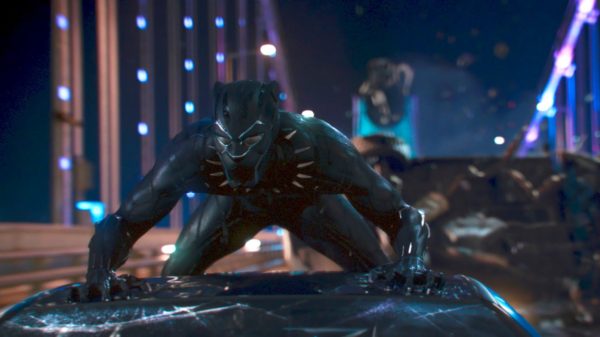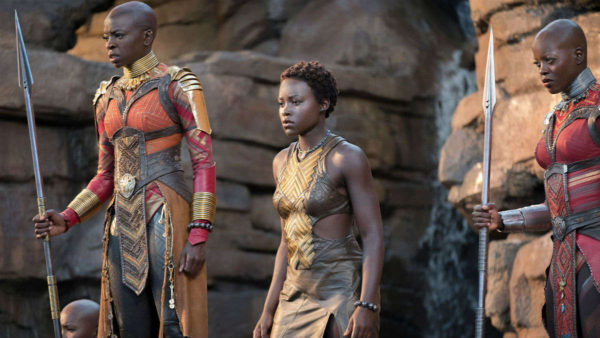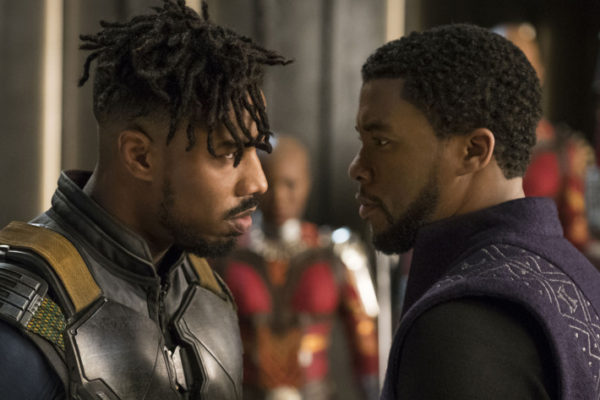Black Panther Review
Since it was announced, “Black Panther” has held the promise of something different from Marvel Studios. It’s been 10 years since the Marvel journey began with “Iron Man” and the narratives, spectacles and formula are in perpetual danger of wearing thin. Co-written and directed by Ryan Coogler (“Creed,” “Fruitvale Station”), “Black Panther” writes its own narrative into the tapestry of the Marvel Cinematic Universe with a thread that is both distinctive and familiar.
“Black Panther” has a lot in common with “Thor” with its hidden fantasy world and elements of near-Shakespearean palace intrigue, but most of the action takes place in the fictional African kingdom of Wakanda instead of out of it, making the film Marvel’s biggest exercise in world-building to date. Coogler must foremost create a people, culture and society that we believe in and care about in as little time as possible. With production designer Hannah Beachler (“Moonlight,” “Creed”) and costume designer Ruth Carter (“Selma”), they create a colorful, vibrant and exciting Wakanda. No fictional place has seemed more appealing to spend time in since the “Avatar” world of Pandora.
Yet that’s purely the sci-fi/fantasy appeal of “Black Panther,” which really makes its mark with themes and narratives of extreme relevance, especially presented through this black lens. The film opens with a prologue in Coogler’s native Oakland, tying the modern day black experience to the Afro-Futurist fantasy experience of Wakanda, a nation of smart, strong black people sitting on top of a “gold mine” of vibranium, the greatest source of power known to man.
The film mostly focuses on how T’Challa (Chadwick Boseman), newly minted king of Wakanda and also its guardian and protector, the Black Panther, wrestles with having leadership thrust upon him. At the same time, the secrecy and isolationist policy long held by his country faces new pressure and danger from the outside world from arms dealer Ulysses Klaue (Andy Serkis) and mercenary Erik Killmonger (Michael B. Jordan).
The story surrounds T’Challa with a team of strong minds and bodies (and terrific talents) including ex-girlfriend Nakia (Lupita Nyong’o), tech-savvy sister Shuri (Letitia Wright), and Wakandan General Okoye (Danai Gurira). There’s also CIA Agent Everett Ross (Martin Freeman), who is a fifth as interesting as any of those characters and actually does amount to the token white guy. Outside of the superhero team-up films, it’s Marvel’s best ensemble.
Yet perhaps all of them — even T’Challa — are overshadowed by Jordan’s Killmonger, whose fascinating backstory and motivation make him Marvel’s greatest villain success, or at least in that first tier with Tom Hiddleston’s Loki and Michael Keaton’s Vulture from 2017’s “Spider-Man: Homecoming.” A villain with conviction and not just some unstoppable force trying to destroy the world, Killmonger makes “Black Panther” much more dramatic and interesting start to finish. He and T’Challa clash in personality and ideology in a satisfying way, one that’s somewhat akin to Martin Luther King Jr. and Malcolm X.
The film offers a buffet of action styles, from a “James Bond”-inspired sequence in a Korean casino to a medieval fantasy battlefield brawl to the one-on-one fight scenes that echo some of Coogler’s work in “Creed.” It’s a little all over the place and some sequences therefore work better than others. What’s more important is most of the time, the stakes feel relevant even when the action gets messy.
Carefully considered characters and themes, however, should account for most of “Black Panther’s” success. That’s how Coogler elevated “Creed” from among all the “Rocky” sequels and similar cliche-ridden boxing films. Creed’s struggle was deeply personal and human. Nearly every character gets that same treatment here.
Thematically, Coogler and Joe Robert Cole do not shy away from relevant black issues, even though the film explores them through fantasy rather than harsh reality. The Afro-Futurist fantasy of a powerful and influential black nation brings with it questions of responsibility that the movie devotes itself to contemplating and addressing. T’Challa must not only decide what kind of leader he wants to become, but reckon with the realities of a changing world.
“Black Panther” triumphs not exclusively as an inspiration to black people wrestling with these same questions, but all of us can consider the fantasy of power and position and how we would use it. These notions distinguish the film from the rest of the Marvel Studios canon, not necessarily the more tangible storytelling and filmmaking elements. The film has weaknesses, many that it shares with other Marvel superhero movies, but those films cannot match its intellectual acuity and social consciousness.
4/5 Stars
Black Panther
Directed by Ryan Coogler
Written by Ryan Cooger and Joe Robert Cole
Starring: Chadwick Boseman, Michael B. Jordan, Lupita Nyong’o, Leticia Wright, Martin Freeman, Danai Gurira







0 Comments
You can be the first one to leave a comment.